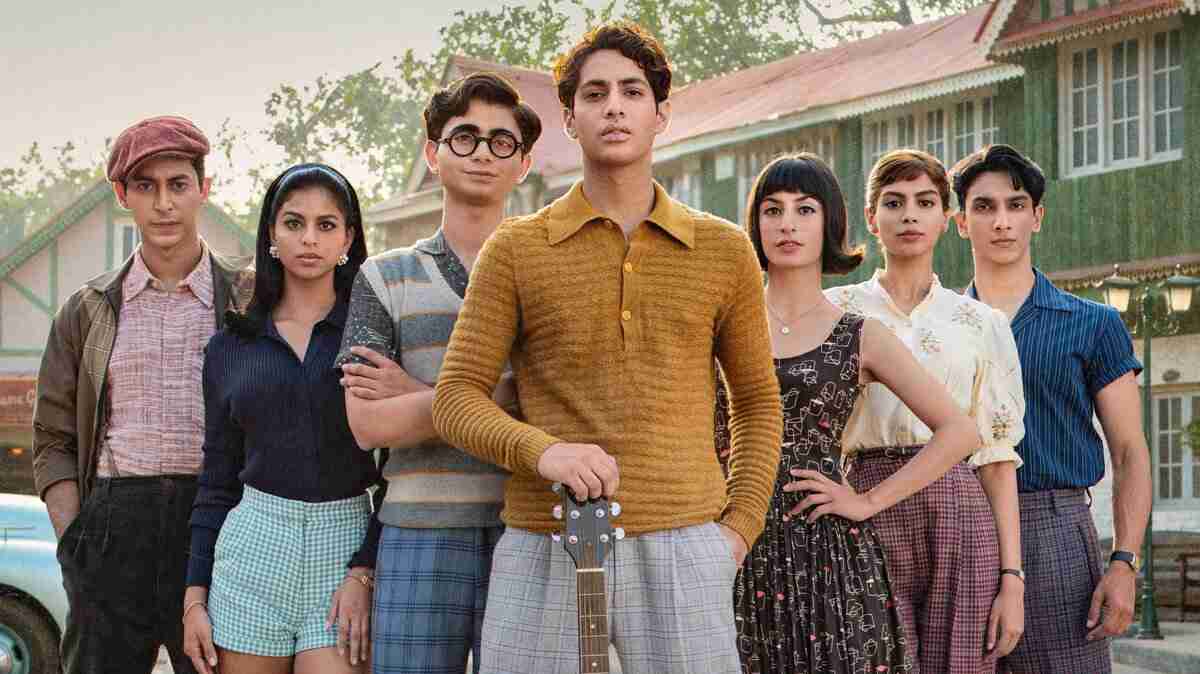Interpreting the transplanting of the Riverdale narrative into an Indian context can evoke contrasting viewpoints. Some may cynically view it as a manifestation of brand colonialism, where established cultural properties are adapted, homogenizing youth culture across different regions. On the flip side, one could choose to immerse themselves in The Archies’ infectious tunes and spirited performances. While enjoying the catchy songs and dynamic choreography, it becomes evident that the filmmakers stealthily weave in unconventional ideas. For instance, the song “Everything Is Politics” subtly hints, akin to the thoughts of Marxist philosopher Louis Althusser, that there’s no escaping the pervasive grip of ideological influence. This juxtaposition of playful elements adds an intriguing layer to the film—a guiltless pleasure despite its whimsical and somewhat ludicrous nature.
Plot
The film sets its backdrop in the 1960s, post-independence, where Riverdale, founded by Anglo-Indians, stands as a symbol of hope and freedom. However, as the story progresses, the teenagers, deeply immersed in Western pop culture, are oblivious to the impending threat posed by the commercial development planned by Mr. Lodge.
The proposed development puts the town’s cherished Green Park at risk, leading to the closure of establishments like the local bookshop managed by Hal, Betty’s father. Amidst romantic entanglements and teenage dilemmas, the youngsters slowly realize the political and economic ramifications of Mr. Lodge’s plans, prompting them to rally against the rezoning of Green Park.
However, while the film touches upon the idea that “Everything Is Politics,” advocating for social activism and community engagement, it somewhat sidelines the deeper exploration of cultural identity and the significance of preserving one’s heritage. The characters, engrossed in personal conflicts and immediate concerns, fail to grasp the essence of their roots amidst the turmoil.
Characters
Let’s talk about the character’s and the storyline they are offered in this comedy drama.
Archie Andrews (Agastya Nanda): Archie is the quintessential heartthrob dealing with the typical teenage dilemma of romance. He’s torn between his affection for Veronica Lodge and Betty, two of his closest companions. His character embodies the spirit of youthful exuberance but lacks a deeper understanding of the cultural nuances shaping his town’s identity.
Veronica Lodge (Suhana Khan): Veronica is the daughter of the affluent Mr. Lodge, representing the privileged class in Riverdale. Her character grapples with the conflict between her personal desires and the impending commercial development of Green Park, which directly impacts her relationships and perceptions.
Betty (Khushi Kapoor): Betty is Veronica’s best friend, whose father, Hal, manages a bookshop in danger of closure due to the proposed development. Her character showcases the struggle of common townsfolk facing the repercussions of modernization, highlighting the socio-economic divide within Riverdale.
Mr. Lodge (Alyy Khan): As the wealthy oligarch planning to rezone Green Park for a commercial project, Mr. Lodge symbolizes the force of modernization threatening the town’s cultural heritage. His actions create a ripple effect, impacting the lives and livelihoods of the residents.
The Struggle of Cultural Identity
Zoya Akhtar’s ‘The Archies’ has marked its presence in Indian cinema with a vibrant blend of music, dance, and a storyline deeply rooted in the Indian cultural milieu. Yet, amidst the catchy tunes and energetic performances lies a missed opportunity to fully explore the essence of one’s roots, especially among the star kids of the film.
The film’s narrative mirrors the essence of the American Archie comics, transposing its universe into an Indian setting, where Riverdale becomes an emblematic town founded by Anglo-Indians in northern India. The opening animated sequence traces the town’s history, emphasizing its foundation post-independence and the symbolic creation of Green Park, a space embodying hope and freedom for the future.
However, the storyline swiftly delves into the lives of the teenage protagonists, seemingly detached from their cultural heritage. The characters, engrossed in Western pop culture, romance, and personal quandaries, are oblivious to the impending threat looming over Green Park. The proposed commercial development by the affluent Mr. Lodge disrupts the lives of the townsfolk, reflecting the intrusion of modernization at the cost of heritage and livelihoods.
Amidst the romantic entanglements of Archie, Veronica, and Betty, the film subtly interjects the concept that “Everything Is Politics,” highlighting the intricate web of power dynamics shaping their lives. Yet, the deeper understanding of one’s cultural lineage and the significance of preserving it seems to be lost amidst the adolescent dramas and the rush to save Green Park.
The film’s portrayal of rural India during the 1960s, blending Hindi and English dialogue, traditional attire juxtaposed with roller-skating dance sequences, creates a unique yet puzzling ambiance. Akhtar and co-director Ryan Brophy infuse the film with vivacity and swift pacing, making it an entertaining watch. However, the film falls short in driving home the importance of cultural awareness and the need to cherish one’s heritage amid the whirlwind of teenage emotions.
The failed approach in making the star kids understand the necessity of one’s roots becomes evident as their focus remains primarily on personal dilemmas and immediate concerns. The film’s potential to delve deeper into the clash between tradition and modernity, and the significance of cultural preservation, seems somewhat sidelined in favor of youthful romanticism and superficial conflicts.
In the grand tapestry of ‘The Archies,’ the subtle undertones of cultural significance fade against the backdrop of teenage angst and the fight to save Green Park. The film, though an engaging musical, lacks the necessary emphasis on embracing and understanding one’s roots, a missed opportunity in exploring the complexities of cultural identity.
While ‘The Archies’ is a lively and entertaining spectacle, its failure lies in not fully realizing the profound message that could have emerged from the intersection of youth culture and the importance of preserving one’s cultural heritage. It remains a tale of vibrant energy but lacks the depth to address the complexities of cultural rootedness amidst the whirlwind of teenage lives.











